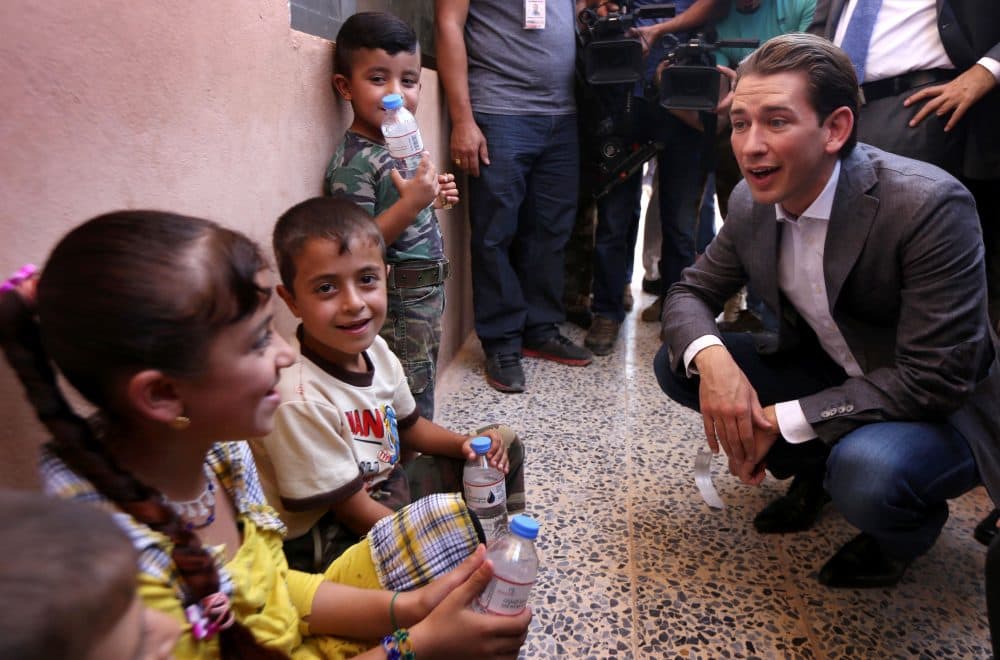Advertisement
Austrian Official: Learn German, Or Work For One Euro An Hour
Resume
Sebastian Kurz, Austria's minister for integration and foreign affairs, is proposing that migrants take one-euro-an-hour jobs serving food at refugee camps until they've learned German. That's about $1.13 an hour.
Those who don't learn German and attend integration classes would see their government benefits slashed.
Last year Austria had more than 85,000 asylum seekers, and the European migrant crisis has become an election-year issue there. Here & Now's Meghna Chakrabarti talks with Máiréad Nic Craith, a professor at Heriot-Watt University in Scotland, about how our perception of others often hinges on the language they speak.
Interview Highlights: Máiréad Nic Craith
On Austria's proposed model
"I think my problem with that kind of model is there is somehow an indication that, no matter how many languages you speak, unless you speak German, you can't do the job. So it's kind of ignoring the fact that a lot of these migrants may have multiple language skills, which might be just as valuable as the German one.
So the issue is the value we place in the different language skills. Certainly I have no problem with a model which is German plus — I mean the EU model really is every citizen should speak their mother tongue plus two more. So it's the idea that, in the world of the 21st century, we should all be able to speak several languages as a matter of routine. But the implication in the Austrian model is, without German you are deficient — regardless of how many languages you speak."
On migrants facing linguistic isolation
"There's an instrumental argument here that says really to connect, people need to speak the host language or the majority language. The issue is though, of course, is if they use the language with which they came, it's perceived somehow as threatening or as not belonging or not wanting to belong more significantly."
"Our lives are stories, we tell our stories through language, and those stories that we carry in our language are not just our own stories, but they're our family's stories, our histories, and our communal stories and our nation's stories as well."
Máiréad Nic Craith
On how governments could encourage language integration without stigmatizing immigrants
"There are some good examples happening now where countries are thinking about… teaching the migrants the language of the country in a new way where it's much more of a equal partnership. So, what is going on is one person teaching the migrant the language, but then the migrant also teaching back something about their own culture.
To give an example of that, one scheme is a gardening scheme in Germany where they call it something like ‘putting your roots down.' Basically migrants and locals garden together, and in the gardening together they get to know one another. Migrants have an opportunity to plant plants form their own country, so there's an exchange of information and ideas about plants, etcetera. Then they also cook and eat together. That's a very different model from the image we have of the local or the native in front of the classroom teaching a bundle of migrants the language they need to learn in order to get jobs.
So I think that kind of blended model or blurred model as I call it, is much better way of dealing with things. While it's a question of getting them to learn German, it's also a question of how can Germany best use the languages they bring with them for the benefits of the country as a whole."
On the idea that language is critical in dividing groups
"First of all I think for a lot of people language isn't critical. For most of us, we wake up in the morning, we don't think about the language we are going to speak today, and we don't think about the implications of that language. It's when a problem arises that suddenly the language becomes critical. So maybe when we see a lot of migrants coming in and hear different languages we feel threatened. Or maybe, if a language is dying out, it suddenly becomes very important.
I think in a way, language has become routine, 'habitus,' is what somebody called it, we just don't think about it. But if you're in a place where your language isn't allowed, or where you're being encouraged to speak a different language, then it suddenly becomes really, really important. And I think it's because communication is a vital part of life. Our lives are stories, we tell our stories through language, and those stories that we carry in our language are not just our own stories, but they're our family's stories, our histories, and our communal stories and our nation's stories as well. So they're all passed on through language, so I think that's why it's so important."
On the hurdles immigrants may face if they don’t learn a country's dominant language
"I think they are [at a disadvantage], because it means they are dependent on someone else. Unless the services are provided in their language, I mean a lot will depend for example, on whether you're in a country that offers services in many languages or just the one. But if you're in a monolingual country, or a largely monolingual country, and you don't speak the language, then you are dependent on somebody else to apply for your passport, to go to the post office, to do your shopping and I think that is not a good situation to be in."
Guest
Máiréad Nic Craith, anthropologist and chair in European culture and heritage at Heriot-Watt University in Edinburgh, Scotland. She tweets @mairead_nc.
This article was originally published on August 25, 2016.
This segment aired on August 25, 2016.